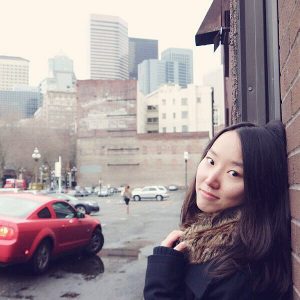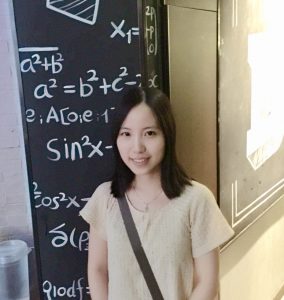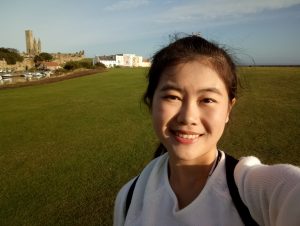We are delighted to introduce three female PhD students funded by the Chinese Scholarship Council.
Xue Guo (JC1.06)

“I am Xue Guo, a returning student from Beijing. My PhD research into Complex Networks is supervised by Prof. Simon Dobson. Last seven years, I hopped over five places: four undergraduate years in BUPT and UCSD, one master year in St Andrews, and two gap years – one in Phoenix TV as a technology journalist, and one in Skyscanner as a software engineer. A three-to-four-year research in one town seems quite a LONG journey for me, but I am sure it will NOT be a LONGLY one in this warm academic community of School of Computer Science. My current research interest is modelling real world phenomena using complex networks, esp. smart city design. Born in Beijing, a city with a population of over 20 million, I have experienced most urban problems that a metropolis can suffer from. I would like to design a research tool for the city designers to generate solutions to traffic congestion and give advice on city infrastructure distribution. I am looking forward to learning from you and exploring more applications of complex networks. In my free time, I enjoy fencing, snowboarding, calligraphy and music.”
Yanbei Chen (JC1.19)

“From 2011 to 2014, I was studying in Zhejiang University in China, with a speciality in Automation. In 2014, I started my master program in KTH Royal Institute of Technology in Sweden, with a major in System, Control and Robotics. In the summer of 2015, I enrolled in Tohoku University Engineering Summer Program in Japan. In the first half of 2016, I conducted my master thesis in the field of machine learning, deep learning and multimodal learning under the supervision of Dr. Atsuto Maki in Computer Vision and Active Perception Lab in KTH.Currently, with the scholarship from China Scholarship Council and University of St Andrews, I will start my PhD study under the supervision of Dr. Juan Ye. My research interests lie in the fields of activity recognition, machine learning, deep learning, and artificial intelligence. From now on, my research will focus on activity recognition based on sensor data from smartphone. In my leisure time, I enjoy music, travel, reading, and jogging.”
Sidi Zhan (JC1.11)

“Hi, I am Sidi Zhan! I completed my BEng in Computer Science at Beijing Foreign Studies University, focusing on recommending doctors to patients in online healthcare QA community. I am now working as a PhD student in Computer Science under the supervision of Dr. Tristan Henderson and Dr. Juan Ye. My proposed research is to enhance peers mutual help and promote their social support in online healthcare community by using recommender to match-make the patient users. My research project will include collecting and analyzing users’ profiles and records data, so policies on user privacy protection will also be examined. I enjoy studying and living in St Andrews, the beautiful coastal city, very much. I am so willing to combine my hobbies with the life here by experiencing local culture, like jogging along the East Sands, singing in a chorus and going Ceilidh dances.”

